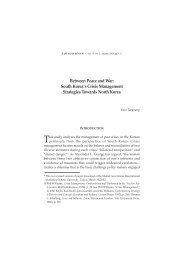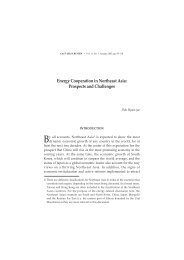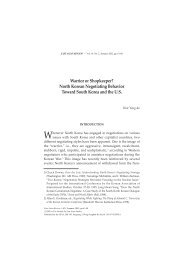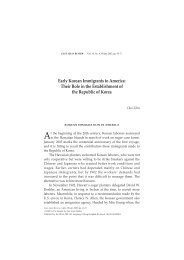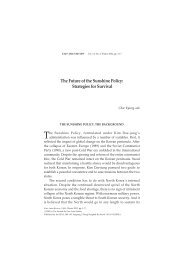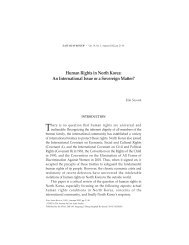Sino-Korean Relations since 1992 - the Institute for East Asian Studies
Sino-Korean Relations since 1992 - the Institute for East Asian Studies
Sino-Korean Relations since 1992 - the Institute for East Asian Studies
Create successful ePaper yourself
Turn your PDF publications into a flip-book with our unique Google optimized e-Paper software.
8 EAST ASIAN REVIEW SPRING 2002<br />
restore <strong>the</strong> China-North Korea relations that existed be<strong>for</strong>e China<br />
established ties with South Korea.<br />
Since China’s policies on South Korea and North Korea are based<br />
on <strong>the</strong> principle of independence, under <strong>the</strong> “post-ideological stance”<br />
and “non-camp based diplomacy,” <strong>the</strong> restoration of China-North<br />
Korea relations does not mean an automatic return to <strong>the</strong> previous<br />
state.<br />
The resumption of summit diplomacy between China and North<br />
Korea, marked by Kim Jung-Il’s visit to China, is, at least from<br />
China’s perspective, based on <strong>the</strong> reality of progress in China-South<br />
Korea to a comprehensive cooperative partnership that includes<br />
security areas; <strong>the</strong>re<strong>for</strong>e, it would be impossible to restore <strong>the</strong> past<br />
special alliance between <strong>the</strong> two. Moreover, North Korea’s attitude<br />
toward improving relations with China can be explained as a process<br />
of adjustment to, and acceptance of “post-ideological perspective,”<br />
“non-camp-based diplomacy,” “<strong>the</strong> end of <strong>the</strong>ir special alliance of<br />
blood-ties” that summarize China’s policy on <strong>the</strong> <strong>Korean</strong> peninsula.<br />
Accordingly, improvements in China-North Korea relations will<br />
move towards normalization based on national interest and<br />
reciprocity, and will not return to <strong>the</strong> past special alliance.<br />
Fur<strong>the</strong>rmore, normalization and <strong>the</strong> move away from ideology in<br />
China-North Korea relations will help to weaken <strong>the</strong> importance of<br />
<strong>the</strong> North Korea factor that had been a major obstacle in China’s<br />
relations with South Korea.<br />
With Kim Jung-Il’s two visits to China, relations between <strong>the</strong> two<br />
countries have normalized, and channels of communication and<br />
contact, including party-to-party contact, between China and North<br />
Korea have been fully restored, making it possible <strong>for</strong> <strong>the</strong> two<br />
countries to adjust <strong>the</strong>ir policies regarding important pending issues.<br />
Accordingly, China’s attitude on <strong>the</strong> <strong>Korean</strong> peninsula question is<br />
changing from that of an indirect and passive one, to that which is<br />
direct and active.<br />
There<strong>for</strong>e, instead of giving automatic support to North Korea’s<br />
position, China will seek an active, constructive role in establishing



